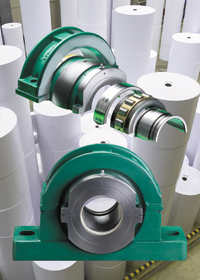
Posted to News on 27th Oct 2006, 12:32
Benefits of split roller bearings in papermaking machinery
The continuous nature of papermaking, the huge production capacity and the substantial capital investment means that unplanned downtime in paper plants is extremely expensive. And planned maintenance windows are becoming shorter and less frequent. Yet the opportunity for slashing downtime by using split roller bearings instead of solid bearings is often ignored.

The major types of bearings used in papermaking machines today are solid types: spherical roller bearings and some cylindrical roller bearings. Both are difficult to fit, impossible to inspect while in place, and even more difficult to replace when they fail. However, because solid bearings are relatively inexpensive and can handle the loads and operating temperatures inherent in papermaking, hardly anyone questions whether they are the best bearing type in all applications.
This is understandable, when the alternative split roller bearing is considerably more expensive than an equivalent-sized solid bearing. However, even with this cost differential, split roller bearings are used extensively in continuous process industries where bearing failures cannot be tolerated. So why do these industries bear the higher initial split bearing cost?
The answer is threefold: much easier bearing fitting – typically a split roller bearing takes only 15 per cent of the time taken to fit a solid bearing; the ability to inspect the bearing in situ; and the ease and speed with which split roller bearings and cartridges can be replaced if there is a problem, without requiring extensive machine dismantling.
A host of advantages
From the technical, economic and pure design perspectives, split roller bearings offer a host of advantages and cut downtime significantly. Basically, the simplicity of fitting a split roller bearing, compared to a solid bearing, is a major factor in its longevity. Unlike solid bearings, SRB split bearings are totally split to the shaft, a design that both simplifies and expedites installation, and cuts downtime to approximately 15 per cent of that required to replace solid bearings of the same size.
In addition, Revolvo SRB bearings can have a longer life span because they cannot be cross-located. They also provide superior sealing arrangements, which means longer bearing life with greatly reduced levels of maintenance. Split-roller bearings can also accommodate a high degree of shaft misalignment, making them suitable for use in heavy applications such as paper mills. The bearings and seals are enclosed by a cartridge housing that swivels within the cast-iron pedestal support; this ensures that seals always remain concentric to the shaft and therefore perform their task of excluding contamination, and retaining the lubricant - therefore preventing costly premature bearing failure.
Split-roller bearings cater for the high temperatures encountered in papermaking with a design that accommodates shaft thermal growth by the movement of the inner race and rollers relative to the outer race of the bearing. This arrangement permits a high degree of unrestricted axial movement within the bearing envelope, allowing for shaft expansion while avoiding additional stresses in the bearing. Standard SRB split roller bearings can operate at temperatures up to 140degC without problems, and operating speeds comparable with other spherical roller bearings on the market, making them highly suitable for applications such as drying cylinders running consistently at over 100degC.
Simple, quick replacement
A further advantage is that the design of Revolvo SRB split bearings allows for complete bearing removal and replacement by simply supporting the shaft. There is no need to lift the shaft, or obtain access to the shaft ends, so expensive and awkward-to-handle lifting equipment is not required. This intrinsic feature is extremely valuable, generally, but especially regarding large machines, where weight and size can be a barrier to fast and effective servicing. It allows for much quicker bearing replacement, which can save continuous-type businesses such as the paper industry a lot of money through reduced downtime.
SRB split roller bearings provide further advantages where there is a requirement to inspect bearings at regular intervals, typically as part of a planned maintenance strategy. Revolvo's SRB design makes this procedure a simple one.
Firstly it provides 'pry' slots to enable easy disassembly of the cartridge housing and pedestal, thereby reducing the likelihood of components being broken, especially in applications where the bearing unit has been installed for some time, and/or where the environment is wet or contaminated.
Secondly, the Revolvo bearing cage design addresses the serious problem of cage clips falling out during the inspection or replacement process. The design achieves this with an innovative design of cage clip, which is retained via spiral pins to one half of the cage during assembly and disassembly. The importance of this feature to maintenance engineers cannot be overstated: lost cage clips can halt production as effectively as any breakdown. Moreover, with Revolvo's retained design, the maintenance engineer benefits from a 'free hand', which helps to speed up the bearing replacement process.
Three years of reliable operation at 100degC
The value of SRB bearings in the papermaking process is highlighted by an application at Lothlorien Paper Mill. Installed to replace solid bearings at the mill, Revolvo SRB split roller bearings have proven their reliability by taking 100degC heat for three years of continuous operation in drying cylinders.
Adrian Menzies, Revolvo's Sales and Marketing Director, puts the success down to the bearings being fundamentally fit-for-purpose. "Part of the reason why SRB split roller bearings are performing superbly after three years in such a harsh operating environment is the fact that they are specifically designed to be extremely tolerant of working in adverse conditions, while supporting very high loads, rather than a conventional bearing design that has to be modified to meet a demanding application."
Want the latest machine building news straight to your inbox? Become a MachineBuilding member for free today >>
















